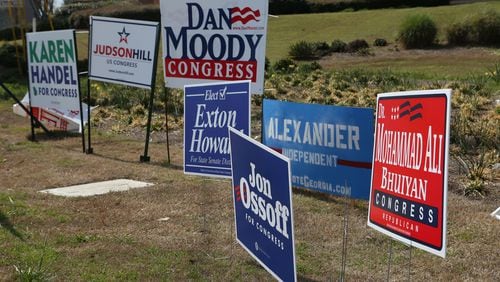It’s a sultry weekend afternoon, and passing cars in a traffic-choked Brookhaven intersection are honking their support — and sometimes disdain — for the crowd of Jon Ossoff supporters waving his campaign’s bright-blue signs.
There stands Adriane Cooper, a Sandy Springs teacher wielding a “Vote Your Ossoff” placard and a chip on her shoulder from Donald Trump’s presidential win. She was drawn like a magnet to the Democratic newcomer who has put Tuesday’s special election to represent a swath of suburban Atlanta at the scorching center of the nation’s political debate.
“This is the first time I’ve been old enough to vote against the people in charge, the people I don’t agree with,” the 25-year-old said. “And this is my way to channel that energy.”
The once-sleepy special election to represent Georgia’s 6th Congressional District has become a Rorschach test for the Trump era: Some see it as an early barometer for Trump’s popularity or a test of the nascent resistance movement to the president. Others see a dry run for the 2018 midterm elections, or they dismiss it as an anomaly.
What’s not in doubt, though, is that the race has turned into a bruising proxy battle between national Republicans and Democrats. A stunning $14 million has been spent on advertising, most of it fueled by out-of-state money.
Ossoff’s dream of winning the district outright on Tuesday seems dim, although not out of the realm of possibility. And his chances of prevailing in a June 20 runoff are long as well. The district’s demographics and voting history tilt heavily in the GOP’s favor.
But the 30-year-old former congressional aide has built a formidable lead in polls. And the infighting among Republicans in the field has led national groups to pour millions of dollars into attack ads hoping to thwart Ossoff’s surprising campaign.
“Republicans fear this becoming the national news. They fear it like the plague,” said former Democratic U.S. Sen. Max Cleland, whose defeat in 2002 heralded a conservative wave in the South. “They know this would put fear in the soul of every Republican running for office.”
The 11 Republicans in the race are shooting for No. 2 in Tuesday’s vote, which would net one of them a spot in the runoff — provided Ossoff falls short of the majority needed for victory. At this stage, the GOP contenders have turned on each other as much or more than they have taken aim at Ossoff.
"If it weren't a fractious primary, it wouldn't be a Republican primary," said Rusty Paul, the mayor of Sandy Springs and a longtime GOP strategist. "The real race starts April 19th."
Trump’s struggles in the district — he won it by about 1 point — have given Ossoff’s supporters a jolt of energy. So has his unprecedented $8.3 million fundraising haul that’s fueled a flood of TV ads, radio spots and mailers. Thousands of his volunteers — and scores of paid staffers — blanket the district.
An Ossoff victory would no doubt be cast as a rebuke to Trump’s young presidency. The district, which stretches from east Cobb County to north DeKalb County, has long been among the safest of Republican seats, and its last occupant, Tom Price, won landslide after landslide until Trump made him his health secretary.
That possibility of a Democrat winning the seat has fueled a tidal wave of coverage from national media outlets wondering whether a ruby-red district can turn blue overnight. The race has also generated intense interest in Washington from leaders of both parties; Trump’s top advisers are said to be closely monitoring the vote and Nancy Pelosi, the House’s Democratic leader, has championed Ossoff’s campaign.
A victory by Ossoff, an investigative filmmaker who was until recently unknown to most Democrats even in metro Atlanta, could make him one of the highest-profile Democrats in office in Georgia, with pundits, politicians and party operatives across the country chewing over what his win would mean.
Is he but a temporary vessel for anti-Trump sentiment, a simple mascot for the wave of frustrated Democrats seeking revenge on a president they can’t stomach? Or is he on the vanguard of a more lasting political realignment, a model for how Democrats can compete in once-solidly Republican districts?
We’re about to find out.
A new meaning of safe
To his most ardent supporters, Ossoff might be a bit of both.
“I’d volunteer for a mannequin if I thought it could win,” deadpans Sherean Malekzadeh, a 52-year-old Ossoff supporter from Brookhaven.
Then, in more sober tones, she explains how Ossoff is the tip of the spear in a larger battle that will upend conventional political thinking.
“If we can flip the 6th, every Republican who thinks he or she is in a safe seat will think again,” Malekzadeh said. “And maybe they’ll start listening to the will of the people and not the tea party.”
Republicans are taking Ossoff’s threat seriously, and activists in Georgia and Washington have been ringing the alarm bells for months.
At GOP grass-roots meetings, party leaders warn of an epic embarrassment. National Republican groups have poured millions into attack ads to deflate Ossoff’s poll numbers, casting him as an inexperienced liberal stooge who doesn’t live in the district. They may be working: Most polls show him in the low 40s.
But the divided field of Republicans, led by four feuding contenders, have their own struggles. They are battling past votes, failed runs for office and campaign trail missteps that could sap their support on Tuesday.
Each, too, is coping with Trump’s long shadow. Some are running as Trump loyalists, others hardly mention his name. Some cast themselves as the true conservative, others as consensus-building independents. Some vow to stand with the president on health care and foreign policy, others have criticized his earliest decision. It’s led to a confusing muddle.
“I’m a middle-of-the-road conservative, and I’ll never vote for Ossoff,” said Brian Bonser of Dunwoody. “But there are way too many candidates in the race. And what bothers me is that Ossoff is getting all the attention, all the money.”
Republican Karen Handel, a former Georgia secretary of state, was the early favorite to emerge. She’s won statewide office and benefits from high name recognition from failed bids for governor and the U.S. Senate. But three top GOP rivals — Bob Gray, Judson Hill and Dan Moody — have launched increasingly bitter attacks as Election Day nears.
That could just be the start, and last week’s special election in Kansas gave Georgians a glimpse of what could come to be. A Republican there won a closer than expected victory against a little-known Democrat, but only after last-minute help from Trump and Vice President Mike Pence.
If the Georgia race drags into a runoff, the barrage from both parties will surely escalate. Leaders from both parties will be free to openly pick sides, and a new burst of national money and attention will flood the district.
‘Not the right fit’
Stretching from the suburbs of Marietta to fast-urbanizing Brookhaven, the 6th District is one of the most affluent and highly educated congressional territories in the nation. It's also been a virtual lock for Republican candidates.
Newt Gingrich and Johnny Isakson once represented parts of the 6th; Mitt Romney won it by 23 points in 2012 and Marco Rubio carried it in last year’s primary. Democrats often don’t even bother to stand for elections in many statehouse and local races, and liberal groups here have long struggled to fill up a living room.
Trump’s election has dramatically changed that. Although he won the state by 5 points, he barely eked out a victory here. And for the first time since Jimmy Carter’s presidential election in 1976, the district’s western flank of Cobb County turned blue.
That’s fueled an outpouring of liberal angst, and new groups are popping up, seemingly by the day, with biting names such as the Indivisible Marching Buddies, Red Clay Revolution and Needles in a Haystack. The Dunwoody Seven — a group that started more than a decade ago with just a few members — now has more members than it can keep track of.
“I’ve never seen anything like this,” said Nancy Watkins, a Northlake retiree who helped start the group. “And I’ve never seen this type of energy before.”
Republicans have struggled to match that intensity. Many GOP forums are packed, but they are quieter affairs. And candidate press conferences and meet-and-greets usually draw just a handful of people. Much of the Republican energy has taken the form of vicious infighting, despite pleas from party leaders.
The district’s numbers, though, firmly favor the GOP. Far more Republicans in the district vote in primaries than Democrats, and conservative-leaning voters appear to have erased the initial Democratic advantage in early balloting.
And the attack ads are nearly unavoidable: They claim Ossoff inflated his resume, mock footage of him as a college student dressed as Han Solo and invoke Osama bin Laden in a spot about his work as a filmmaker for the Qatari-based Al-Jazeera news outlet. That latter ad drew a particularly furious round of condemnation from Ossoff and his allies, who called it a desperate smear.
The ads appear to be working on some conservatives.
“We need to work together more, and introducing another Democrat to our delegation will only make things worse,” said Danny Ross, a Dunwoody venture capitalist. “Ossoff’s resume is questionable and he overreaches. He’s a bright guy, but he’s not the right fit.”
Republicans don’t intend to let up. Ossoff’s prodigious fundraising has sparked a new barrage, with barbs from Republicans noting that only 5 percent of his donors live in Georgia — and reminders that Ossoff doesn’t live in the district. (He lives near Emory University, where his girlfriend attends medical school, and plans to move into the district when she graduates.)
Still, anxious conservatives note that special elections are notoriously difficult to predict. And there’s never been a special election in Georgia quite like this one, making it even harder to make projections. Close observers of the race from both parties seem to waver by the day over how well Ossoff can perform.
“This race is reflecting peoples’ anxieties. People are anxious now about a lot of things: health care, the economy, the leadership in the executive branch and the White House,” said Evan McMullin, a conservative who ran for president as an independent candidate in 2016 and is supporting Republican David Abroms in the 6th. “What we’ll see here is a reflection of that.”
‘Prepared for anything’
If Ossoff has any hope of winning, he must change the electorate to expand beyond the 47 percent of 6th District residents who voted in November for Hillary Clinton. The more than $6 million he’s spent on the race is trying to do just that.
His campaign has flooded Democratic-leaning houses with two, three, four mailers a day. Some residents have gotten handwritten postcards from neighbors urging them to “flip the Sixth.” Residents with landlines complain their phones haven’t stopped ringing.
Actor Samuel L. Jackson joined in the effort Friday with a radio ad encouraging voters in the district to “vote Democratic.”
But it’s gone beyond that. Ossoff’s financial muscle has allowed him to target others outside the party’s orbit, including voters who have cast ballots in sporadic Republican primaries or those who rarely vote at all. Pieces of mail vow he’ll “fight Trump” even as Ossoff sticks to a less acerbic messaging about attracting high-tech jobs and cutting wasteful spending.
“We’ll be ready to fight and win a runoff,” Ossoff said. “The grass-roots intensity that we’re building every day shows we’re fighting for a win on April 18, but we’re prepared for anything.”
He’s speaking after a rally with nearly 100 supporters who treated him like a celebrity when he showed up at the Dunwoody Library. After a round of selfies, he’s asked what he made of the surge of attention to the race.
“It has got very little to do with me personally,” he said, choosing his words carefully, “and everything to do with the times that we’re living in and the kind of community that this is.”
Republicans alternate between anxiety over a potentially epic embarrassment and supreme confidence. At a Sandy Springs campaign stop, Handel tried to exude an air of inevitability about the outcome.
“Look, we’re a little fractured right now,” she said. “But on April 19th, when all the votes are counted, we will all come together on the morning of the 19th and get ready to kick some Ossoff.”
Whether the race ultimately gives Democrats the win they are pining for or reinforces the district’s Republican credentials, it might not be a good indicator of what’s ahead.
Kyle Kondik of the University of Virginia’s Center for Politics, says it’s better to look at the outcome as “one data point that may or may not confirm national trends.”
For residents of the district, however, this may be only the beginning of the attention.
“It’s been incredibly energizing, an opportunity I’d never thought I’d see,” said east Cobb resident Jen Cox, who supports Ossoff. “And we’re just getting started.”
About the Author








